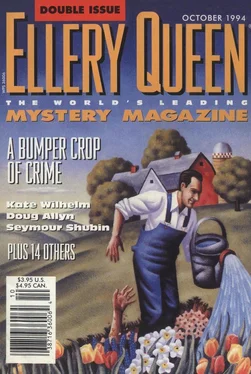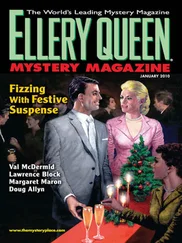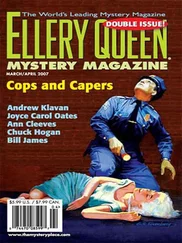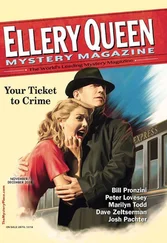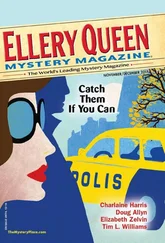Doug Allyn - Ellery Queen’s Mystery Magazine. Vol. 104, No. 4 & 5. Whole No. 633 & 634, October 1994
Здесь есть возможность читать онлайн «Doug Allyn - Ellery Queen’s Mystery Magazine. Vol. 104, No. 4 & 5. Whole No. 633 & 634, October 1994» весь текст электронной книги совершенно бесплатно (целиком полную версию без сокращений). В некоторых случаях можно слушать аудио, скачать через торрент в формате fb2 и присутствует краткое содержание. Город: New York, Год выпуска: 1994, ISBN: 1994, Издательство: Dell Magazines, Жанр: Детектив, на английском языке. Описание произведения, (предисловие) а так же отзывы посетителей доступны на портале библиотеки ЛибКат.
- Название:Ellery Queen’s Mystery Magazine. Vol. 104, No. 4 & 5. Whole No. 633 & 634, October 1994
- Автор:
- Издательство:Dell Magazines
- Жанр:
- Год:1994
- Город:New York
- ISBN:ISSN 1054-8122
- Рейтинг книги:4 / 5. Голосов: 1
-
Избранное:Добавить в избранное
- Отзывы:
-
Ваша оценка:
- 80
- 1
- 2
- 3
- 4
- 5
Ellery Queen’s Mystery Magazine. Vol. 104, No. 4 & 5. Whole No. 633 & 634, October 1994: краткое содержание, описание и аннотация
Предлагаем к чтению аннотацию, описание, краткое содержание или предисловие (зависит от того, что написал сам автор книги «Ellery Queen’s Mystery Magazine. Vol. 104, No. 4 & 5. Whole No. 633 & 634, October 1994»). Если вы не нашли необходимую информацию о книге — напишите в комментариях, мы постараемся отыскать её.
Ellery Queen’s Mystery Magazine. Vol. 104, No. 4 & 5. Whole No. 633 & 634, October 1994 — читать онлайн бесплатно полную книгу (весь текст) целиком
Ниже представлен текст книги, разбитый по страницам. Система сохранения места последней прочитанной страницы, позволяет с удобством читать онлайн бесплатно книгу «Ellery Queen’s Mystery Magazine. Vol. 104, No. 4 & 5. Whole No. 633 & 634, October 1994», без необходимости каждый раз заново искать на чём Вы остановились. Поставьте закладку, и сможете в любой момент перейти на страницу, на которой закончили чтение.
Интервал:
Закладка:
The old folk are beginning to depart this world.
Before they go, they visit each other. They fly from one part of the world to another. Their children and grandchildren slip boxes of chocolate to airline stewardesses and say, “He’s eighty,” “She’s ninety.” The airline stewardesses smile and promise to look after them.
After a short stay, a stay too short considering the length of the journey, they part in the knowledge that this is the last time they will ever see each other. They put a cheerful face on it, not to depress the other one, of course. It’s the way you leave life that matters. After all, none of us could help the way we came in. In the meantime, they urge each other, remember to keep in touch.
One day my mother received a letter from her old friend Frau Josefa Hsueh. Under the attempt at euphemism, in her stilted Germanic English, old Frau Hsueh was “preparing to go.” Before she went, she would love to see someone, anyone, to remind her of some of the old days.
My mother, in her turn, wrote to me, beginning her letter with the ritual formula the circumstances required, “Old Frau Josefa Hsueh is about to prescribe you long life...” Having got the ritual part over, Mother asked me to visit the old lady. I was always gadding about on the Continent and heaven knows where else, she wrote. Instead of wasting my time and money on such idle pursuits, why not visit old Frau Hsueh. Such an act would be written down for me in the world to come (while my mother is neither modern nor trendy, her theology is remarkable).
I wrote back and said my holidays weren’t for some time, as she well knew.
Mother wrote back and said she had already taken the precaution of sending the dates of my vacation to Frau Hsueh, when she was “most likely” to expect me. Would I please, please remember, continued Mother, how we had done things in the old days. Get a really nice basket, not one of those plastic carriers with the name of a supermarket chain printed in ugly letters over it, and fill it with goodies. Cover the basket with a nice cloth, perhaps something in Irish linen. Frau Hsueh is very poor, Mother concluded, please don’t skimp on the size of the basket. Go to a good continental delicatessen in your own area and explain what it is for. If the proprietor comes from the Continent, Mother wrote pointedly, everything will be fresh and of the best quality for such a purpose, never mind what they sell to everyone else.
In my sarcastic reply I wrote that I had no doubt there was a delicatessen not far from Frau Hsueh where I could buy the nicest things. My German wasn’t all that good, but it would stretch to shopping for food. Germany is a rich country these days, I pointed out, and I was sure the goodies there equalled those in my corner shop, run by a lovely Indian family with preconceptions about our diet that antedated the Raj.
My mother’s reply was both anguished and angry.
It seems, she wrote to me, that I had forgotten the good old ways after all. To bring food to Frau Hsueh from her own corner shop was mere charity. To prepare the gifts before one left on one’s journey, to wrap each item individually, to pack them in a beautiful container, was to demonstrate care and forethought towards an old friend. And, for heaven’s sake, no duty-free label on the cognac. Finally, don’t forget Frau Hsueh’s initials on the tablecloth, napkins, and towels, which she hoped weren’t to be purchased at a sale.
I set off sure that I looked like Little Red Riding Hood. Security men at airports gave me that extra frisk. Airline stewardesses raised their elegantly pencilled eyebrows to indicate what they thought of my hand luggage. A youthful German customs officer tried to chalk a mark on the basket, gave up, laughed, and said, “You are come from dem old days, nein?”
In the event, like Little Red Riding Hood, I arrived too late. The coffin was already in a side room of the cemetery chapel. In accordance with the ecumenical spirit of our times, or mere functionalism, it served for Catholics and Protestants alike.
A youthful Herr Pastor, who looked as if he had been a village baker and joined the church when a conglomerate had taken over supplying bread, shook my hand in a friendly manner. I was taken aback. In Tientsin, Lutheran ministers and missionaries, believing in the word becoming flesh, were an aloof lot, concentrating on the power of their words. The later commissars of the Eighth Route Army had been like that. But Herr Pastor Weber was as friendly as the English missionaries I had once known; he held me by the hand and elbow and told me that the news of my impending arrival had given great comfort to the old lady. Fortunately, Herr Adolf (here he lowered his voice and said he was afraid that name had been rather common then) Fleischmann had arrived before she died. That, too, he said, had been a great consolation to her. Herr Pastor insisted that I should call him David, as he knew that in English-speaking countries everyone used first names. So much friendlier than the old German ways. Next I was introduced to Adolf, who didn’t seem to enjoy being addressed so familiarly. He wore the sort of look that said, “Don’t drop dead in front of me. I’ve got other things to do than call the undertaker.” However, he recognised my surname and condescended to state he had seen it in Tientsin.
In the equally ecumenical chapel Herr Pastor in his address said that whilst there was no family, two very old friends had journeyed a long way to be present. This led to us being treated as chief mourners. Herr Pastor led us to the grave, Fleischmann and I in front of those in attendance, mostly very old people.
Fleischmann stood naturally impassive as Herr Pastor performed the graveside ceremony. Two shovels stuck out of the earth, one on each side of the open grave. He and I motioned to each other to throw the first clod of earth, and when he said, “You are a guest in our country,” I went first.
The rest shovelled a clod of earth and shook hands with Fleischmann and me, offering their condolences, as if we were closely related to the departed. Fleischmann tried to look as if it was no concern of his, but after the third or fourth handshake his mouth set in a firm line.
All those who had shaken hands with us walked away. Herr Pastor motioned Fleischmann and myself to stay, “It is our custom for the family to stay behind. Perhaps you will act as her family and utter your farewells.” Fleischmann shook his head, indicating he had nothing to say, and gestured at me, as if to signal that I was more likely to say something. I cursed him mentally, and stretched my German to its uttermost limits with the trite hope that the earth would be as soft as a pillow under her head.
Herr Pastor invited us back for coffee. I was still clutching my luggage, including the basket, and when we got to his house, offered to open it up. We had the usual argy-bargy as they refused and I insisted, opening the cognac and pate.
“I knew Frau Hsueh had a great tragedy in her life,” said Herr Pastor, “but she never spoke of it. Perhaps one of you...”
Fleischmann had already tossed off his cognac. I poured him another one. For the first time I was aware of a prolonged nervous tic. He raised his head, inclined it to one shoulder, and then moved it to the other shoulder in a long arc. An uncle of mine who had been beaten by Japanese soldiers occasionally did this when under stress. “This gentleman,” said Fleischmann, breathing in deeply as if to stop himself from stammering, “has travelled farther than I have. Perhaps he knows more. I should like the pâté.”
Since my childhood, in fact, virtually since I began to learn English, I have always been a great fan of the crime novel. With all due respect to the authors of the Haliburton Readers , it is Edgar Wallace and Leslie Charteris I have always considered my English teachers. It was probably the reason why I had always wanted to see England. I visualised every country lane concealing a body, every cathedral city at least one murderer. As for London, it must be full of murderees, though I was to discover, to my chagrin, the word did not exist.
Читать дальшеИнтервал:
Закладка:
Похожие книги на «Ellery Queen’s Mystery Magazine. Vol. 104, No. 4 & 5. Whole No. 633 & 634, October 1994»
Представляем Вашему вниманию похожие книги на «Ellery Queen’s Mystery Magazine. Vol. 104, No. 4 & 5. Whole No. 633 & 634, October 1994» списком для выбора. Мы отобрали схожую по названию и смыслу литературу в надежде предоставить читателям больше вариантов отыскать новые, интересные, ещё непрочитанные произведения.
Обсуждение, отзывы о книге «Ellery Queen’s Mystery Magazine. Vol. 104, No. 4 & 5. Whole No. 633 & 634, October 1994» и просто собственные мнения читателей. Оставьте ваши комментарии, напишите, что Вы думаете о произведении, его смысле или главных героях. Укажите что конкретно понравилось, а что нет, и почему Вы так считаете.
